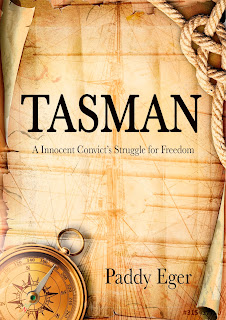The year is 1850. Accused of a crime he didn’t commit, sixteen-year-old Ean McCloud faces a daunting three-year sentence at Tasmania’s infamous Port Arthur Penal Colony. According to a Google source, some 1100 prisoners died there during the 50 years the notorious penitentiary served as one of the harshest in Australia.
Young Ean McCloud was arrested for a crime he did not commit. Accused by someone who wanted him out of the way, he also paid a price for being born Irish. Remember that Ireland's potato famine began in 1845 and didn't officially end until 1852. During those years when some 1,000,000 Irish men, women, and children starved to death, between 1,000,000 and 2,000,000 fled the country to avoid the same fate. Despite the desperate circumstances of those who stayed, the English offered very little relief to the poor tenant farmers who relied on potatoes to feed them and their families during the cold winters. Furthermore, years of conflict between the two countries had made those of Irish descent unwelcome residents in England. To say that Ean McCloud was a victim of circumstances is indeed an understatement.
Sent to Tasmania on a prison ship after being found guilty in a London court, he was treated as an adult criminal despite his youth and innocence. Tasman chronicles his time there, the people and situations that threatened to destroy his last thread of hope, the ultimate death sentence, and the surprising support that materialized from an unexpected source.
This is a fabulous story, a powerful page turner that is difficult to put down. I strongly recommend it as a must-read for all lovers of historical fiction—and many others, as well.
 |
Editor Linda Lane has returned to her first love—writing—while still doing some editing. Her character-driven novels, although somewhat literary in nature, remind the reader of genre fiction because of their quick pace. They also contain elements of romance, mystery, and thrillers. You can contact her through her website: LSLaneBooks.com |





Sounds like a good book, Linda. I think one of the saddest things is when someone is convicted of a crime they didn't commit and sees a good part of their life from within prison walls. I wrote one book about that, though it was fifteen years. Thanks for the review.
ReplyDeleteIt's an excellent book, Polly, and a realistic peek into Great Britain and Tasmania in the mid 1800s. Sad as a portion of the story is, it also has some positive aspects that leave the reader satisfied with the ending.
DeleteSounds like a great story, even though it's not light reading, but I do like stories that dip deeply into human tragedy and show the good that can rise from that.
ReplyDeleteI don't like tragedies that leave me depressed at the end of the story; nor do I like tales that gloss over human difficulties as though they are nothing. For me, I like reality and the ability of people to overcome the pitfalls that befall so many and come out victorious. Life may never be the same for them, but it holds out a promise of better—perhaps unexpected—things to come. Tasman is that kind of story.
ReplyDelete